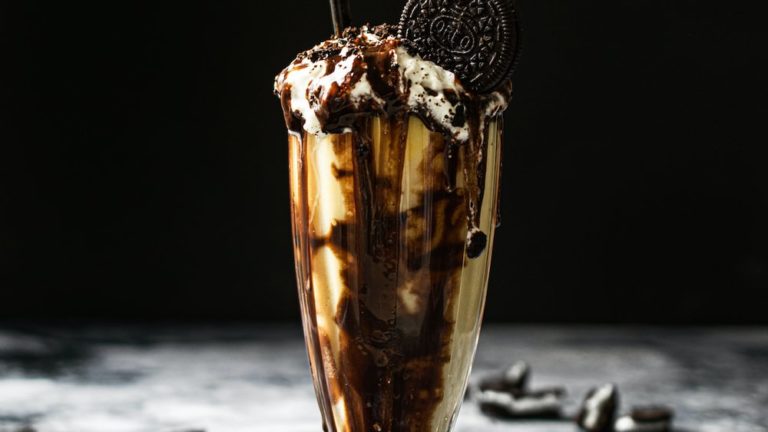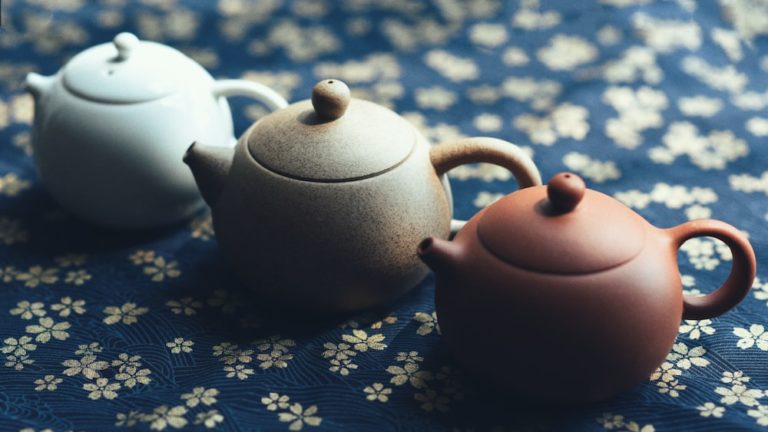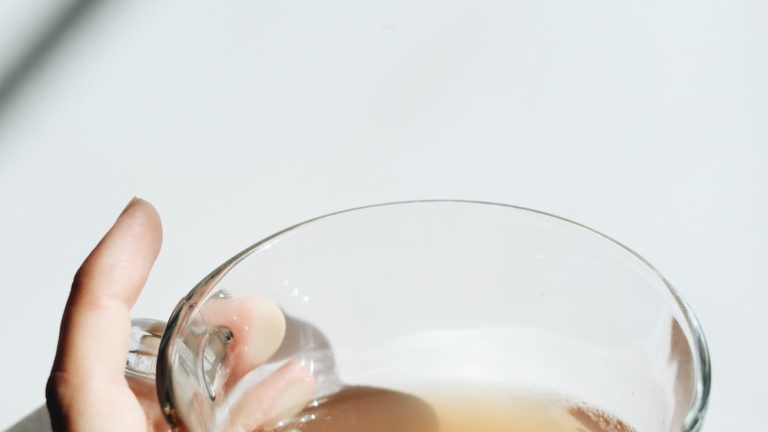Does Green Tea Help With Bloating? 11 Teas To Find Relief
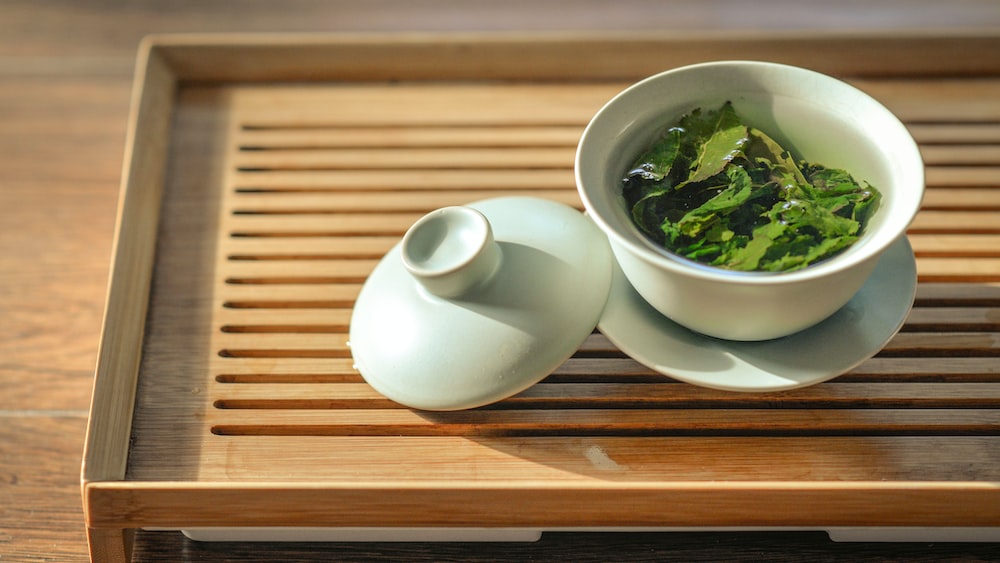
Does Green Tea Help With Bloating? 11 Teas To Find Relief
Welcome, tea enthusiasts and health-conscious comrades! Ever found yourself feeling like an overinflated balloon? You know, those times when your belly is distorting the fit of your favorite jeans and you’re left wondering if you’ve been magically and unwillingly entered in a beer belly contest. We’re talking about bloating, folks – an unfortunate and uncomfortably common ailment that plagues so many of us. And what about those fancy detox teas with their promises to banish bloat overnight – do they actually work, or is it just wind in your sails?
Now, let’s not get carried away. We’re not talking about that magical “deflating” potion from Wonderland that Alice drinks. Instead, we’re on a hunt for a humble cup of relief – AKA, green tea, and a few other varieties. Sounds simple enough, right? Yet, it seems like everyone and their grandmother has an opinion about the bloat-beating benefits of tea. So, let’s cut through the noise, shall we?
Well, go grab your best brewing pot because we’re diving right into this boiling pot of confusions – unpacking the truth about bloating, why it can make you feel less like a human and more like an overly enthusiastic float in a parade. We are going to see if our faithful old friend Green Tea (and some of her flavor siblings) might be the answer to all our uncomfortable prayers.
Understanding Bloating
Before we start steeping, let’s first understand what exactly is causing this bloated hoopla. We don’t really want to barge into the party without knowing the cause of all that jazz, now would we?
What is Bloating?
If you think bloating is just an aesthetic bother, you’re mistaken, dear readers! You see, bloating is like that uninvited guest at your tea party, making everything a tad bit uncomfortable. But instead of pinching all your cucumber sandwiches, bloating swells up your belly, often accompanied by pain, discomfort, and a gassy feeling. It’s like your abdomen is blowing up a balloon, but forgot to stop adding air.
Interestingly, bloating feels different for different people. Some of our dear readers described it as a sensation of feeling inflated, full, or stuffed. Feel like you have a bowling ball in your tummy? That’s bloating for you. Interestingly, bloating due to gas buildup might also make your belly audibly rumble. An inner belly orchestra, anyone?
But what does cause all this hullabaloo in your abdomen and turns it into a pneumatic party? Is it that one extra taste-test of your newly baked lemon balm cake or something more ominous? Let’s find out!
Bloating is not just an aesthetic bother, but rather a discomforting sensation that can make your abdomen feel inflated and stuffed, often accompanied by pain, discomfort, and a gassy feeling.
Common Causes of Bloating
Ever felt like your belly has taken on the persona of a balloon and is ready to float you up like that kid from Up? Welcome to the causes of bloating.
- Overeating: Yes, we’re all guilty of being a bit too fond of grandma’s cookies. But one common cause of bloating is overeating. Overstuff yourselves, and your digestive system goes into an overdrive, causing discomfort.
- Swallowing Excess Air: Who knew talking while eating could inflate you like a hot air balloon? When you eat or drink too quickly, you end up swallowing a lot of air, which leads to a bloated belly.
- Gas-inducing Foods: Some foods are gas bombs waiting to explode in your belly. We’re talking about beans, lentils, broccoli, onions, carbonated drinks, etc.
- Constipation: Skipping the toilet bowl too often? Constipation can make you feel as if you’re lugging around a suitcase of bricks in your belly.
- Food Intolerances: It’s not just your melodramatic ex who has intolerance issues, dear readers. Your tummy might also have intolerance towards some foods (like lactose, gluten), leading to bloating.
Now that we’ve painted a dashing image of what might be making your belly do the chubby bunny challenge, how does green tea stride in to save the day?
The Role of Green Tea in Alleviating Bloating
As it turns out, green tea could very well be our Sherlock Holmes, ready to thwart the bloating drama unfolding in our bellies. Let’s investigate further!
Green Tea Contains Antioxidants
We all know bloating isn’t a ballroom dance. But one of the main ingredients of green tea – antioxidants, also known as catechins, might just be the Fred Astaire we need.
These antioxidants attack inflammation like a ninja, leaving you feeling lighter and your belly flatter. As per a study published in the Critical Reviews in Food Science and Nutrition, the major polyphenolic compounds in green tea have anti-inflammatory properties. Who wouldn’t like a flat belly complimented by a lower risk of chronic diseases, right?
What’s more, these antioxidants can help clear the route for your digestive enzymes, making the process smoother and possibly leading to, you guessed it, less bloating!
Green Tea Has Antibacterial Properties
Now, let’s get a little science-y, shall we? Ever heard of Helicobacter pylori bacteria? Sounds like something out of a sci-fi movie, doesn’t it? But it’s not as cool as it sounds. In fact, this little critter is often the culprit behind stomach bloating.

But don’t worry, our army of green tea is to the rescue! According to research, the catechins in green tea can suppress the growth of this bacteria, fighting off bloating. Like a secret agent, green tea sneaks into the realm of your belly, outsmarting the bloating baddies in their own game.
Green Tea Reduces Fluid Retention
Leaping closer to the ‘does it or does not’ answer, let us spill some tea on how green tea is a natural diuretic. Diuretics help your body get rid of excess water and sodium. Ever felt like you’re holding more water than a cactus in a desert? That’s fluid retention for you, and it can make you feel bloated. And this is where green tea might just play its trump card.
Green tea influences the hormones that regulate water and electrolyte balance, thus promoting urination and reducing fluid retention. Thus, a regular green tea drinking habit could be a way to wave goodbye to bloating caused by fluid retention.
Green Tea Helps to Break Down Fats
Now, it’s time for some juicy bits. Did you know that green tea assists in the breakdown of fats? And no, we’re not spinning fairy tales. It’s a well-researched truth. It’s like green tea put on its Superman cape, ready to swoop in and rescue us from the ‘Bloat-ville’.
As per a study published in the Journal of Nutritional Biochemistry, the catechins in green tea help the body to break down and digest fats better. By doing this, the chances of belly bloating due to slow or incomplete digestion reduces. Meanwhile, an increased metabolism from these fats attacking properties only adds to the effect, helping you feel less like a Beached Whale and more like a Floating Feather in no time.
11 Teas That Can Help With Bloating
And now, drum roll, please! Let’s dive head-first into a world of aromatic, healing, and bloat-busting teas that can bring delicious relief to your irritated tummy. Ring the kettle cause here we go!
1. Green Tea
First on our magical tea ride is green tea. What’s not to love about this superhero of the tea world? From its high antioxidant levels to its belly-soothing abilities, ladies and gentlemen, green tea has got it all! It’s like the swiss army knife in the world of teas, surprisingly versatile and always reliable.
Green tea comes packed with powerful antioxidants called catechins, known to take care of business when it comes to reducing inflammation. Picture these little warriors in your stomach, squashing the rebellious gas bubbles causing all that bloating. Several studies even suggest that regular consumption of this wonder brew might help with digestion and breaking down fats. Time to matcha your way to a happier belly!
2. Peppermint Tea
Next up, we’re whisking you away to the refreshing vistas of Peppermintville. Ah, peppermint tea, with its invigorating aroma that smells like a toothpaste commercial and a taste that can send your senses on a cool, breezy mountain hike. Yes, please!
Peppermint tea has been known to soothe upset bellies for ages. Just picture it: those minty-fresh leaves, wrapped around your grumbling stomach like a cooling blanket on a hot, uncomfortable day. With its potent antispasmodic properties, this delectable cup of goodness can help relax your digestive muscles and relieve that bloated feeling.
But that’s not all, folks! Peppermint is also loaded with the compound menthol, which can act like a virtual traffic controller in your stomach. It makes sure everything is moving smoothly down there, averting any unpleasant stomach ‘traffic jams’. I don’t know about you, but sign me up for a peppermint traffic update any day!
3. Ginger Tea
Who’s up for a little spice in our tea tale? Enter, ginger tea. This zingy favorite is like the life of the party in the tea world, firing up your digestive machinery and ensuring things run smooth as silk.
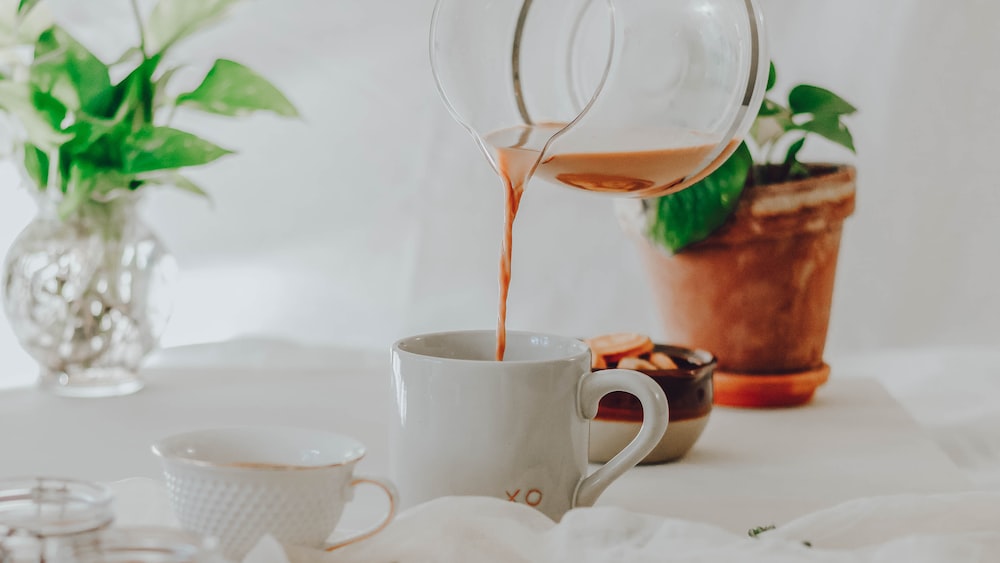
Envision the spicy ginger, doing a flaming salsa dance in your stomach, knocking out any rowdy gas bubbles creating mayhem. This is all thanks to to ginger’s potent anti-inflammatory properties. And, if you’ve got food sitting in your belly like an overstayed house guest, this fiery brew can help speed up digestion and show them the exit!
But wait, there’s more to this gnarled root beauty! According to numerous studies, ginger tea can significantly reduce bloating and gas. Oh yes, ginger is our cup of tea for turning the ‘bloat boat’ around!
Ginger tea can help with digestion, reduce bloating and gas, and is our cup of tea for turning the ‘bloat boat’ around!
4. Fennel Tea
Taking a detour from spiceland, we find ourselves amidst the sweet earthiness of fennel tea country. If your stomach were throwing a tantrum, fennel tea would be the calm, soothing voice coaxing it back into happiness.
Fennel, with its distinct licorice-like flavor, isn’t just a fancy addition to your dishes. When brewed into a wholesome tea, it acts like a superhero, swooping down to save your stomach from the evil clutches of bloating. Its superhero powers come from a compound called anethole, which can soothe the stomach muscles and kick-start the digestion process.
5. Chamomile Tea
Oh, chamomile, sweet chamomile, the lullaby of teas. This delicate, flowery brew not only soothes your senses but also your overworked tummy. It’s akin to a soft, melodious serenade that waltz your weary stomach muscles into a relaxed dreamlike state.
Countless studies have shown that Chamomile tea has properties that may relieve gas, soothe the stomach, and relax the muscles that move food through the intestines. So kick back, cup in hand, and let chamomile do the midnight belly soothing while you dream of tea fields!
6. Dandelion Root Tea
Say hello to the underdog in the tea world, dandelion root tea. You might recognize these as those yellow pesky invaders in your garden, but did you know they pack a punch when it comes to beating bloating?
This flower power brew comes loaded with diuretic properties, acting like your personal rainmaker in the drought of bloating. Picture this: dandelion roots, gearing up like mini excavators, working hard to help your body get rid of excess water. Bye-bye water retention!

And that’s not the best part. This unsung hero from your backyard is also a rich source of vitamins A, C, and E, and minerals such as potassium and iron. It’s like a mini health booster in your boring old cup of water. Blossom into health with a warming dandelion root tea.
7. Lemon Tea
We’re squeezing a bit of citrusy sunshine into our tea journey with lemon tea. Think of it as a morning burst of sunshine in a cup, sweeping away the dull clouds of bloating from your belly.
Lemon tea acts like a cleanse for your digestive system, sweeping away unwanted toxins in your body. Imagine these zesty lemons, acting like the cleanup crew after a wild party in your stomach. Everything gets tidied up, leaving your stomach feeling light and refreshed!
8. Hibiscus Tea
Stepping into the tropics, we’re met with hibiscus tea. This vibrant floral brew is like a Tahiti vacation for your taste buds and a chill pill for your stomach, all wrapped up in a pretty pink cup.
Known for its tart, cranberry-like flavor and stunning crimson hue, hibiscus tea worked its ways in the world of wellness like a royal. The bold tanginess of the hibiscus going to work like a well-oiled machine, coaxing your stomach into releasing trapped gases and reducing water weight.
But hang on to your teacups, because there’s another showstopper quality about this tropical goddess. Hibiscus tea contains compounds that work like ACE inhibitors (a common heart medication), which can help lower blood pressure. So, it’s not only a treat for your tummy troubles but also a boon for your heart!
9. Gentian Root Tea
Lastly, we’re taking the road less traveled, straight to the land of the bitters, with gentian root tea. You might scrunch your face a little at the pronounced bitter taste, but hang in there, your stomach will thank you!
Gentian root tea is like a wake-up call for your digestive system. Consider this: the bitterness of the gentian root rouses your digestive enzymes from their slumber, getting them all prepped and ready to break down your meals more effectively. Talk about putting some serious ‘pep’ in your digestive step!
This age-old remedy has been traditionally used to treat loss of appetite, fullness, and stomach upset. A few studies also vouch for its benefits in relieving symptoms of bloating and gas. So, my friends, a word to the wise – embrace the bitters; they’re better than you think!
Gentian root tea is a wake-up call for your digestive system, rousing digestive enzymes and improving meal breakdown.
10. Wormwood Tea
Have you ever heard of wormwood tea? If not, buckle up, because we’re going on a rather whimsical journey. Wormwood, a herb that seems to have been plucked straight out of a fairytale, packs a real punch in helping to alleviate bloating. Studies have shown that wormwood has potent digestive benefits. It’s like the little engine that could of the digestive world, chugging away at gassy, bloated guts and ensuring they’re running like well-oiled machines.
But, just like an exotic spice in cooking, a touch of caution here is a good idea. Wormwood is known to carry some potentially alarming side effects if consumed in too big of quantities. As Shakespeare once said, “What’s in a name?” Well, with wormwood there might just be a tiny hint provided about its impact. So, we suggest taking a slow and steady approach with this herb, which could potentially double as an ingredient in a witch’s potion!
However, without risking ourselves to any witch’s snare, wormwood tea, in controlled quantities, could be a powerful ally for bloating relief. Make it a part of your tea library but ensure it stays on the “sometimes borrowed” list, rather than “always in use”.
11. Caraway Seeds Tea
Caraway seeds – they might seem the embodiment of the term “small but mighty”! Not only does it add a soul-satisfying punch to your food, it is a useful source to reduce bloating. Making a cup of caraway seeds tea could feel like summoning a tiny band of superheroes, each seed bustling with the power to combat bloating and gas. Fun fact – caraway is a potent source of essential oils that facilitate digestion and relieves inflammation in your digestive tract.
Consider it your very own guard against the bloating villains. Brew a pot, sit back, sip, and enjoy the protective magic of caraway seeds tea. A pro tip? Combine it with a dash of honey and let it become a soothing ally in your quest for a happy, healthy tummy!
How to Incorporate These Teas into Your Diet
Incorporating these teas into your diet doesn’t have to be a task as complicated as deconstructing a World War II enigma machine! It’s all about finding the right balance and understanding your own body. Think of it as creating your personal brew of Hogwarts potions class, each tea with its unique properties and benefits. A cup or two per day of the different teas we have discussed might just be the key. Play around, mix it up, and remember to consult your doctor if you have any health conditions.
FAQs
1. How often should I drink these teas to help with bloating?
When considering the frequency to drink these teas for bloating relief, it should be kept in mind that moderation is key. It is generally safe to consume these teas two to three times a day.

2. Can I combine these teas or should I drink them separately?
Regarding whether you can combine these teas, the answer is yes. It is perfectly fine to create your own blend of teas, as long as you enjoy the flavor and they do not cause any discomfort.
3. Are there any side effects of drinking these teas?
While side effects of drinking these teas are generally minimal, every individual is different. Always start with smaller portions and watch closely for any adverse reactions.
4. Can these teas replace medical treatment for chronic bloating?
As for whether these teas can replace medical treatment for chronic bloating, they cannot. These teas should be regarded as complementary to conventional medical treatments, and not as replacements. Be sure to seek a healthcare provider’s advice for chronic health conditions.
Conclusion
As we come to the end of our whimsical tea journey, it’s evident that the world of teas is a vibrant, diverse, and health-enriching universe, particularly when combating the bloat! But remember, while tea can be both a relief and a delight, it’s always important to remember those wise words – moderation is key!
So, as you fill your pantry with an array of teas, remember to listen to your body and seek expert advice if needed. After all, we enjoy our tea best when it enriches our health, not complicating it. Now, fill your mug with your preferred brew, inhale the calming steam, and sip, smile, repeat.
Here’s to happy tummies and serene tea times! Ciao, Bellas and Bellos!! Zoe over and out!

